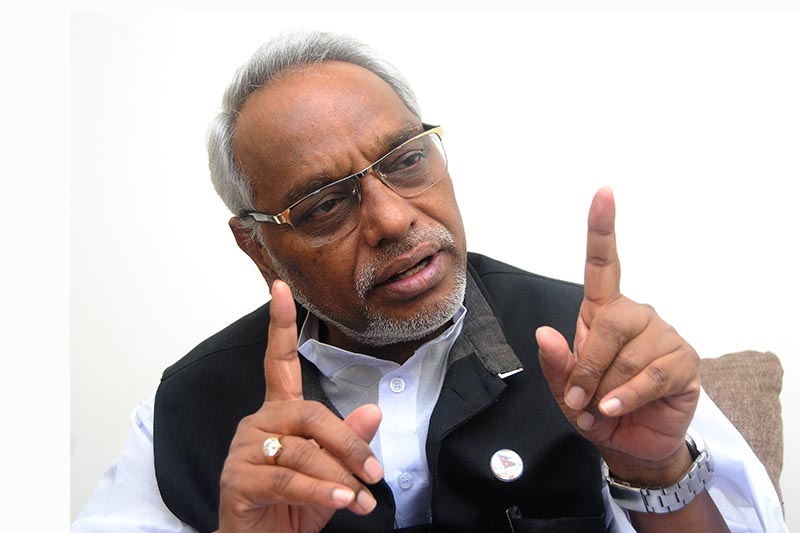Intra-party rift in RJP-N widens
Kathmandu, November 28
The rift in Rastriya Janata Party-Nepal over its decision to rotate the leadership of the presidium every two months is hindering the party from taking a decision on its pledge to withdraw support to the government after Chhath festival for failure to address the party’s demands.
The RJP-N had demanded that the constitution be amended and false cases slapped against its cadres be withdrawn.
The RJP-N rift surfaced after the party’s recent decision to replace its Coordinator Mahantha Thakur with Rajendra Mahato and rotate the leadership of the party’s presidium every two months. This move has riled some Thakur loyalists.
RJP-N presidium member Anil Kumar Jha had opposed the party’s decision to change the presidium’s coordinator on the ground that the decision was against established rules and procedure.
Party sources said dissatisfaction in the party was the main reason why the RJP-N, which had threatened to withdraw support to the government after Chhath festival, had not been able to hold meeting to take a call on political issues.
Some leaders close to Thakur, particularly Joint General Secretary Surendra Jha and senior Vice-chair Brikhesh Chandra Lal argued that the party’s decision to change the presidium coordinator was illegal as it was not taken unanimously in accordance with the party’s rule.
Thakur served as the party’s coordinator for 19 months.
RJP-N General Secretary Keshav Jha, however, said that Section 16 (5) of the party’s statute provisions rotating the presidency of the presidium every two months and hence there was no need to take a decision to this effect unanimously. “Even Thakur had agreed to rotate the leadership of the presidium,” Jha said.
RJP-N lawmaker Brikhesh Chandra Lal said the effort to remove Thakur from post of coordinator of the presidium when the party was preparing to hold its first General Convention had resulted in an uneasy situation in the party. “I think the decision to remove Thakur as coordinator had the hidden agenda of some leaders who wanted to fulfil their personal interests rather than the party’s interests,” he said and added that the party’s decision would mar the environment in Madhes where forces that steered the movement in the past were trying to unite under the banner of the RJP-N.
Another Thakur loyalist SurendraJha said, “Thakur is an honest leader who is truly committed to the Madhesi cause. There are other leaders who think they might not be able to join the government if Thakur remains coordinator of the presidium,” and added that they were pressuring the party to either hold the meeting of the political committee or office bearers soon so that they could express their grievances.
He said another member of the RJP-N presidium Mahendra Ray Yadav’s recent comment that Thakur had failed to guide the party was humiliating and he should apologise for it. He also said the release issued on November 20 had accused Thakur, albeit indirectly, of not being able to make enough preparations for the first General Convention of the party. “Thakur is a simple and honest leader who gave his consent to the decision but those who engineered the decision on November 20, had a hidden agenda,” he said.
According to him, the party’s decision to quash all the nominations made by Thakur after the party submitted its list of Central Working Committee members and office bearers was wrong and could even lead to dissolution of the party. “If senior leaders of other parties join the RJP-N and if they are not given the promised posts in the party, how can the party survive?”
RJP-N leader Laxman Lal Karna said Anil Kumar Jha’s note of dissent did not raise the question of legality because in the past, there were three occasions when members of the presidium wrote note of dissent but the party went ahead with its decisions, including its decision to take part in elections last year.
The new RJP-N Coordinator Rajendra Mahato said he would try his best to hold the GC on the stipulated date April 20-22 and establish his party as an alternative democratic force.






